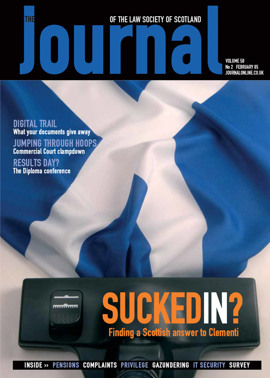Not the final word

I must take this opportunity to congratulate the Client Relations Office on successfully meeting the target of completing 90% of complaints within nine months. This achievement against a background of further increases in numbers of complaints year on year in our ever more consumer-driven society is a tribute to their efforts. Complaints handling is a major part of the Society’s statutory responsibility and costs the profession £1.4 million per annum. Resources have rightly been devoted to the improvement and modernisation of the arrangements and this is ongoing. I would urge firms to recognise the importance of handling consumer dissatisfaction themselves. Earlier resolution is always desirable. High quality client care is vital for successful business, and with the IPS compensation limit being increased to £5,000 the financial penalty for failure is substantial, not to mention the opportunity costs.
Sir David Clementi has reported and you will be able to read in Douglas Mill’s article more about what he has to say. From my perspective, the report is a disappointment in its failure to elaborate on solutions. It seeks to narrowly address “English” problems (I sometimes think the Welsh must get even more cross than we Scots about misuse of “English”). On complaints handling the report effectively adopts the Society’s position on a single gateway – that it will create an additional layer of bureaucracy and result in additional costs without any appreciable benefit. The report however proposes that the way forward for consumer service complaints in England and Wales is an independent Office of Legal Complaints, removing responsibility from the profession and likewise detaching the opportunity to learn from complaints. Detachment to this extent may impact on the extent to which solicitors remain as a profession. I hope the progress made in this area by the Society in Scotland will add strength to our arguments on the proposals for improvements to the regulatory regime.
The competition zeitgeist pervades the Clementi report, particularly in relation to legal disciplinary practices. Non-lawyer ownership is seen as desirable to promote competition, investment and innovation. The Society specifically suggested that if this well trailed line was to be adopted, flesh be put on the regulatory arrangements. The report’s failure to do so is disappointing and symptomatic of its broad-brush approach, seeking to hit the big issues without fully exploring the consequences. An absence of detail leaves unanswered questions.
It compares unfavourably to the scoping study which preceded it and instead is carried along with the tide of competition theory. It may be thought that as solicitors, we should publicise our brand and compete with non-lawyer-owned providers of legal services. In my view, non-lawyer-owned LDPs do not sit comfortably with professional regulation and I, for one, will argue against the Society regulating LDPs.
These will be matters for an increasingly interesting agenda at the AGM in the Royal Museum of Scotland on 18 March. It is a great opportunity to participate in discussions which will impact on each and every one of us. Do try to come if you can – especially if you have not been to an AGM before.
Can I also urge you to join in some desk-based research into our profession. At the end of February all solicitors will receive a questionnaire from the Society and the Equal Opportunities Commission. Please take the time to complete and return it, as the information gathered will be extremely important. The more responses received the more valid the research.
For many, the Asian tsunami has had a major impact and we all seem increasingly responsive to visible need, as demonstrated by the monies raised. I would like to close by telling you about someone I met last month. A fellow guest at a dinner party floored me with the answer she gave to the usual question about what she did. A South African living in Johannesburg, she and her husband have set up a small home for abandoned babies, many of whom have HIV Aids. Some respond to treatment but infected children are unpopular for adoption, so she is fostering two children who are infected by the virus but have responded to treatment. She is currently endeavouring to set up a second home. The tragedy with which she and her husband are battling will not achieve major media impact, but their work is giving immediate and real help where it is much needed. I decided to tell you about this charity and publicise it in a small way so that if you would like to make a donation you could send it to me at the Society and I will forward it to her. The weakness of the rand against the pound means that any sterling donation will be worth its weight in gold.
In this issue
- Sell or transfer? (1)
- Promoting competition or competitiveness?
- Promoting competitiveness or competition?
- Not the final word
- Challenge of the FSA
- The pull of the south
- A world of change
- Finding the path
- An elusive model?
- Bank on it
- Trouble at t'mill
- Hidden evidence
- Money claims on behalf of children
- Secure connections
- Tread carefully
- Sell or transfer?
- Cracking the conflict code
- X Factor for success?
- Scottish Solicitors' Discipline Tribunal
- Website reviews
- Book reviews
- Is "gazundering" always bad?
- Defining the guideline






